Pro-Palestinian camp causes stir at the Faculty of Science: ‘People are pushing and crossing boundaries’
-
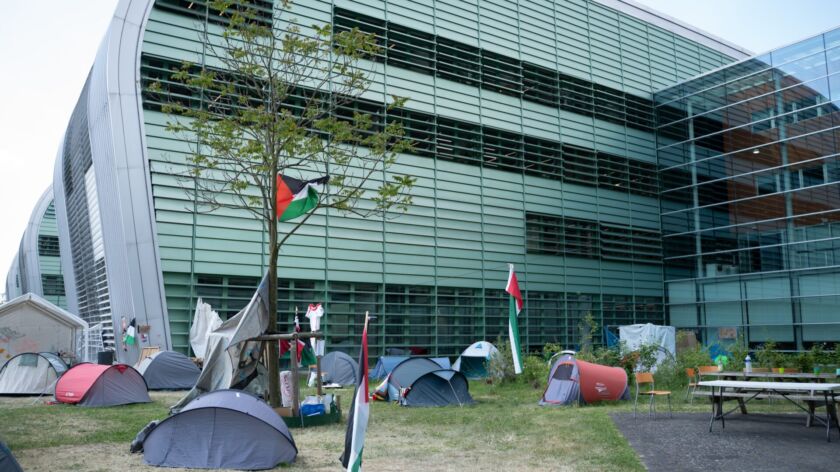 Foto: Vox
Foto: Vox
An encampment of pro-Palestine activists has been standing in the backyard of the Faculty of Science for a week now. It is causing a stir within the Faculty, which has taken all kinds of security measures. How long will the encampment be allowed to stay? Dean Sijbrand de Jong does not know. ‘We don't really have an exit strategy.’
‘The tents have been there for a week now and in the beginning everything was very peaceful and pleasant,’ Dean of the Faculty of Science Sijbrand de Jong tells us from his office on the second floor of the Huygens building. To prevent vandalism, the Faculty did take a number of measures as soon as the encampment was set up, including closing three entrances and the basement car park.
‘The building is now open only at the front, to facilitate monitoring. We have created a few parking spaces in front of the building for disabled employees who are now unable to park downstairs.’ Opening hours are also limited.
A week into the encampment, the Dean notes that people are pushing and crossing boundaries. ‘We agreed with the protesters that they would not cause any destruction or enter the buildings. But they have done so anyway.’
Cancelled
The BBB Career Event, which was scheduled to take place at the Huygens building on Wednesday, has been cancelled. The University has reached this decision in consultation with the security triangle. ‘The safety of our students and staff is paramount in this situation,’ the Faculty wrote in an internal email. The BBB Career Event is a business fair organised by students.
De Jong is referring among other things to the disruption of the Dies Natalis celebration last week. Plus, some activists did enter the Huygens building. And some graffiti did appear on walls, including the slogan Faculty of Murder. Cut Ties, which was spray-painted above the main entrance. ‘It is terrible to be called that. Some people react to it more strongly than others. It also weakens sympathy for the activists within the building.’
And that while many Faculty of Science employees want pretty much the same thing as the activists, says De Jong. ‘Many people in this building agree with quite a few of their demands. I think everyone wants the conflict in Gaza to end as soon as possible. And for something to be done to help the Palestinian people.’
‘Personally I don’t feel unsafe; I’m not easily intimidated’
The slogans that are chanted and that appear on flags and signs in the tent camp are causing ‘a growing number of’ employees to feel uncomfortable or even unsafe, according to the Dean. ‘These include Israeli employees, who are still struggling with trauma from previous conflicts between Israelis and Palestinians,’ says De Jong.
Is there any reason for people to feel unsafe? Are there indications that people are at risk?
‘No, there are no concrete indications that people are in danger. Personally I don’t feel unsafe; I’m not easily intimidated. But I can certainly imagine that a flag with an inverted triangle – which is just a sign of Hamas – can be intimidating for people. Especially for our Jewish staff.
‘Even before the encampment, I already heard stories about harassment incidents, including a Jewish employee who was working in our building on a Hebrew keyboard being shouted at.’
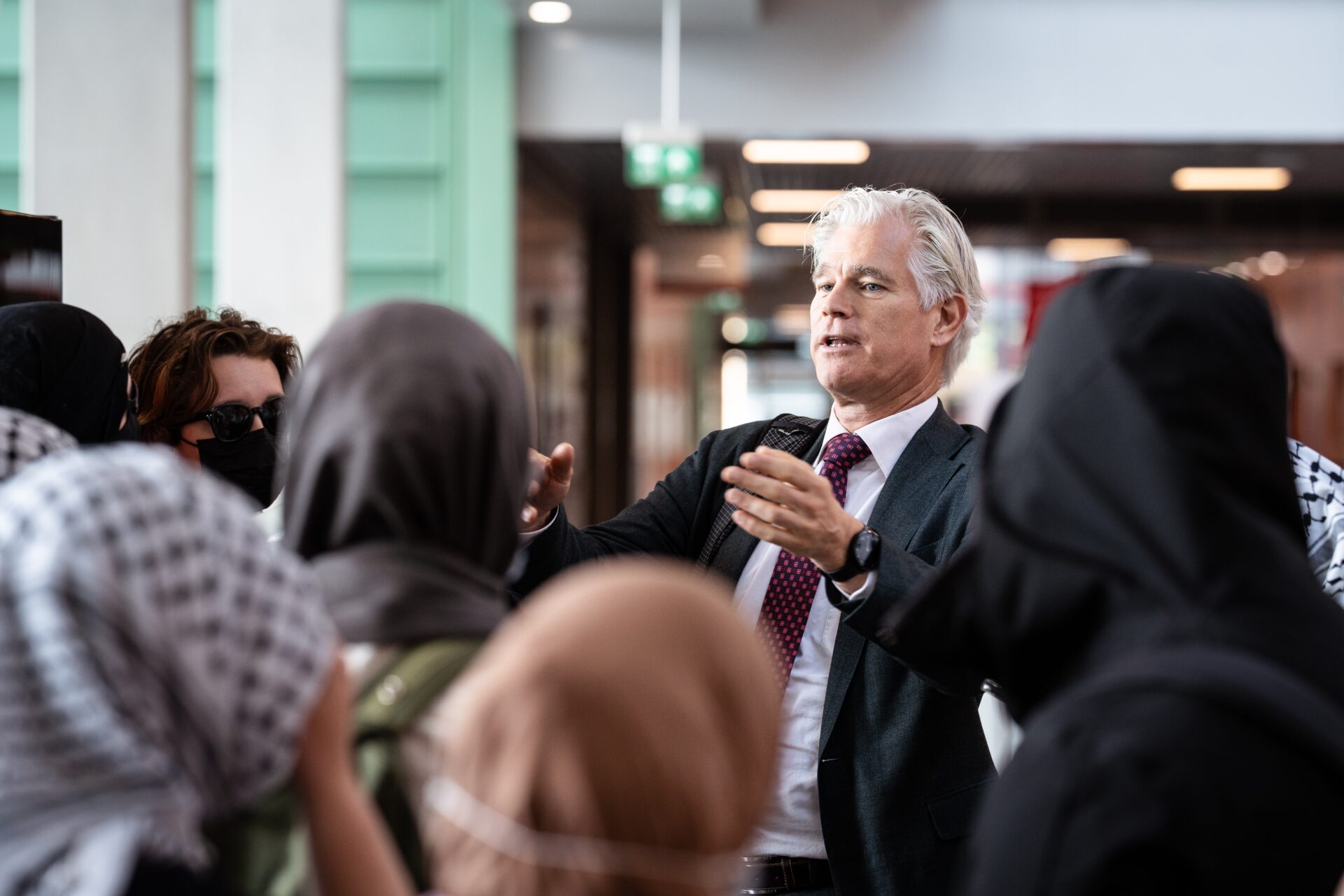
How many employees have come to tell you that they are feeling unsafe?
‘About a dozen employees have dared to speak to me about this. The Jewish staff mainly say: I try to behave as much as possible as a non-Jew. There is very much a tendency to try and be as invisible as possible.’
Can employees go about their normal work despite the extra security measures due to the encampment?
‘Yes, even the employees who need access at night or on weekends have all been entered into the new system by now. So that is all sorted out.’
Meanwhile, a statement has also been released by the Executive Board on severing ties with Israeli institutions. How is the Faculty of Science dealing with these kinds of ties?
‘First of all, I think it is very unfortunate that these rules are still not definitively clear. But I assume that the recommendations of the Buydens committee, which we all think are pretty wise, will be adopted.’
‘For existing contacts, of course, there really has to be an identifiable reason for us to decide to stop’
‘We have certainly been very careful in the past year in choosing which partnerships we do and do not enter into. Not only with Israel, by the way, but also with other countries. It is something we have been thinking about since I first took office in 2022.’
Can you make it more concrete?
‘My starting point in this matter is very similar to that of the committee. First of all, you need to distinguish between institutional and personal collaborations. We no longer engage in institutional partnerships with suspected partners.
‘That is the case even if potential violations of human rights or other debatable objectives are not fully proven. Especially with new collaborations. For existing contacts, of course, there really has to be an identifiable reason for us to decide to stop.
‘This faculty has had no institutional ties with Israel or Israeli institutions for a long time. We do have joint European contracts like in Horizon Europe, which also involve other parties.’
How does the Faculty of Science deal with collaborations initiated by scientists themselves?
‘In such cases, we look at the topic around which there is collaboration. If that comes too close to moral objections, human rights violations, or other unethical issues, we don’t do it.
‘But if it is clearly okay, then this kind of partnership is fine. In fact, in such cases, I encourage collaboration with anyone. Also with people living in countries under regimes you don’t really want anything to do with. Just to keep the communication lines between people open.’
Can you give an example of a collaboration that was discontinued?
‘I can give an example of a situation that was not black and white, and where we decided not to do it anyway. A collaboration – I cannot mention the specific details – on cybersecurity, in which we were also training people. At some point, there was some interference from a questionable regime.
‘That is where we draw the line. As a result, we no longer give guest lectures in summer schools in certain countries on certain cybersecurity topics. The staff members were not pleased that I forbade them to do it.’
So cooperation on an issue that could help Israel in any way in their fight against the Palestinians would not be tolerated?
‘That is right. And it is also the responsibility of the individual scientist concerned. If we find out that someone in involved in a collaboration in which human rights are at stake, such a person can expect to be called in for a very serious chat with me.
‘We have no authority to remove people from the premises’
‘But it is also unpredictable, because some things that seem innocent now may turn out not to be totally innocent in the future.’
What about the protesters’ plea to cut all ties with Israel?
‘It is not clear what the best approach is – total isolation or only allowing certain collaborations – even when you look at examples from the past.’
How long can the encampment stay as far as you are concerned?
‘I don’t have a clear idea about that yet; we don’t really have an exit strategy. That is not for me to decide anyway, but for the Executive Board. And ultimately, the decision does not even lie with them. The Executive Board can report disturbances to the triangle of security – we have no authority to remove people from the premises. Our security cannot do that.’
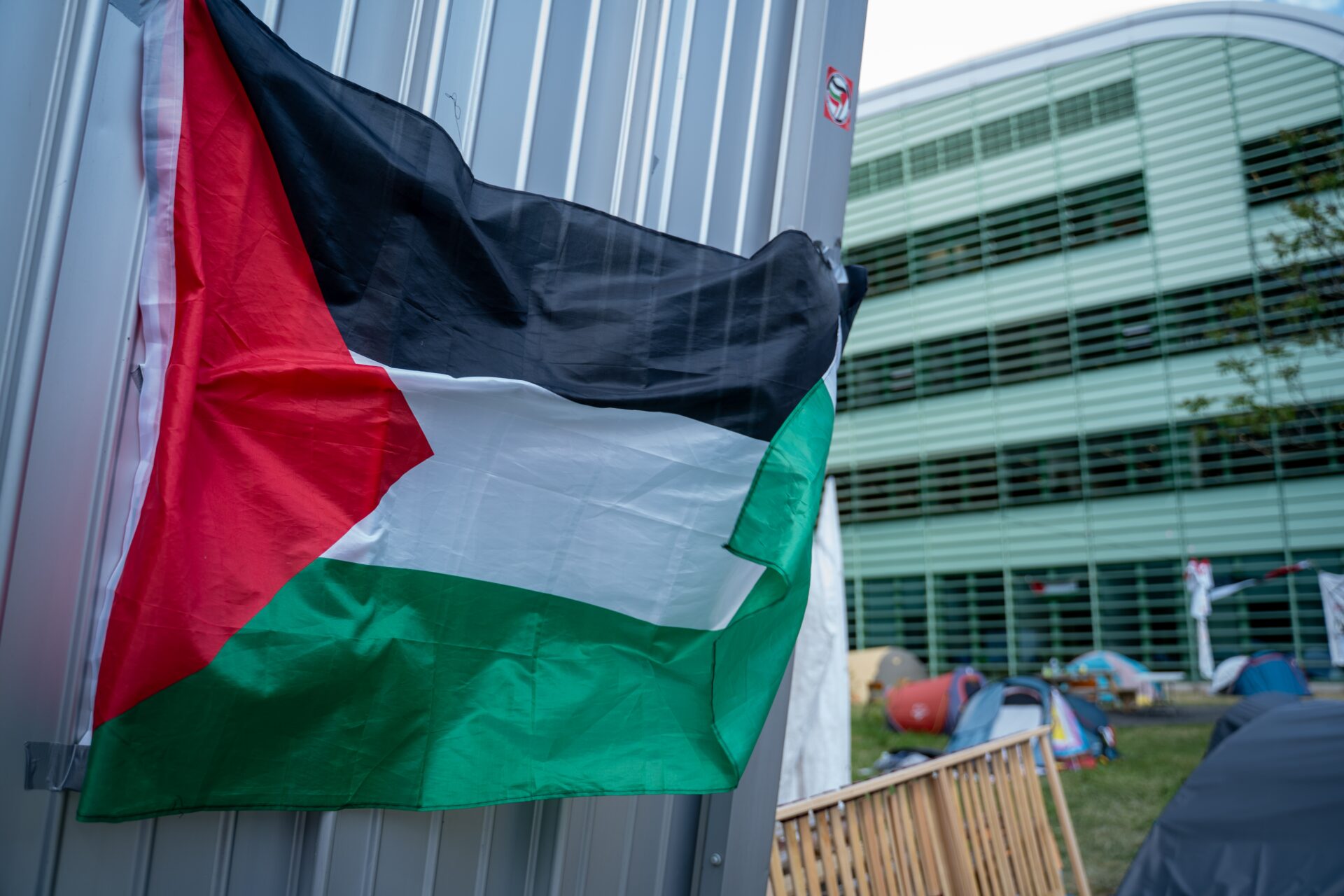
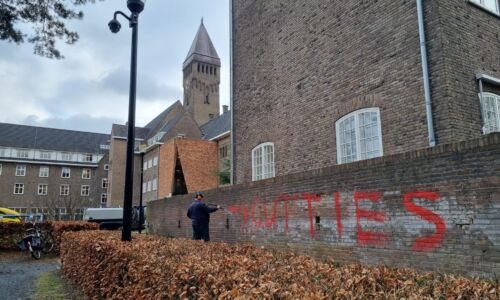
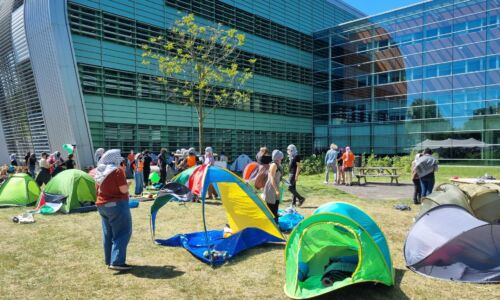
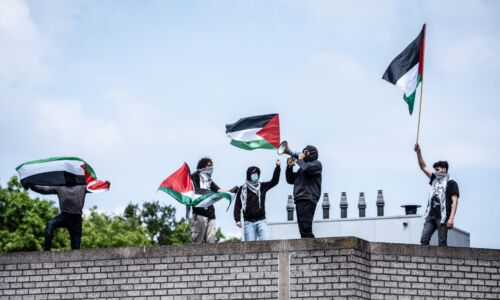

Absurd schreef op 21 mei 2025 om 12:49
The conflation of Jews and Zionism still presists in the narrtive of even the dean of the science faculty. I have news for you there are jews in the camp from staff and from students. The conflation of Jews ( An Ethno/religious/cultural identity) and zionists ( a ethnonatioanlist political ideology) is not only wrong but also Antisemtic as it essetinalizes jews as political subject that is only distruptive and predetatory, an image Nazis’s shaped and spred to justify thier persicuation.